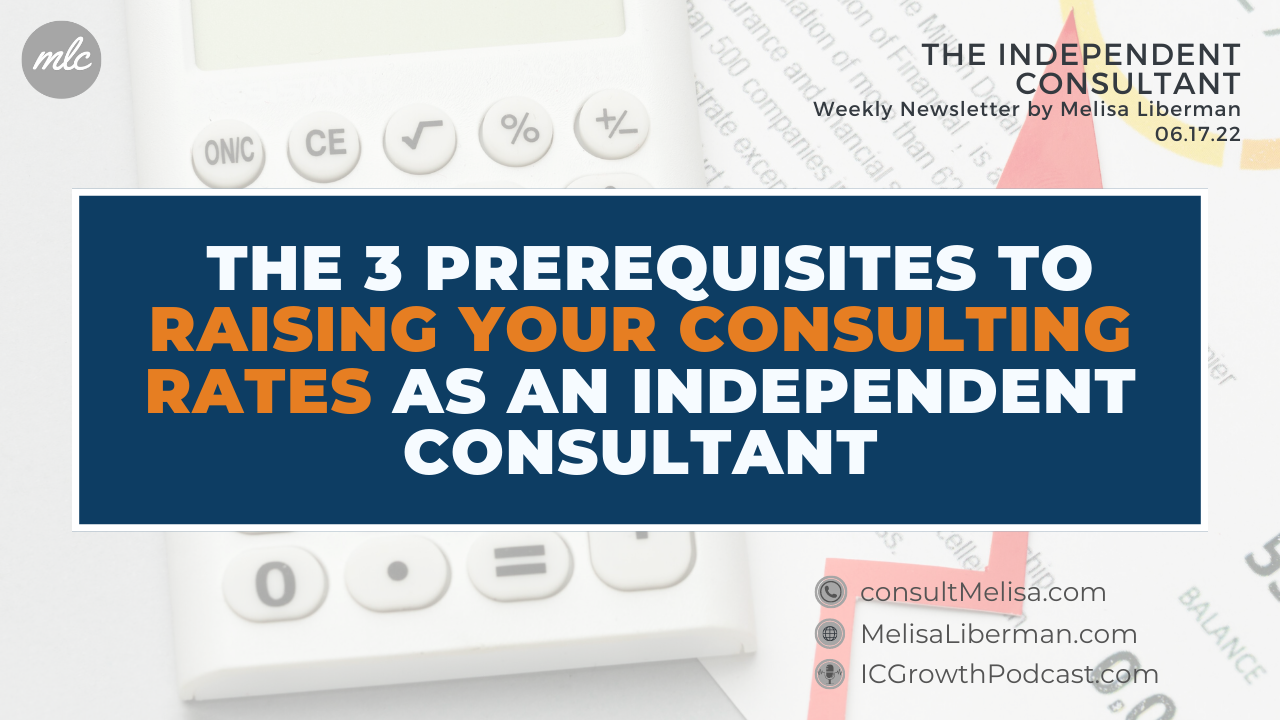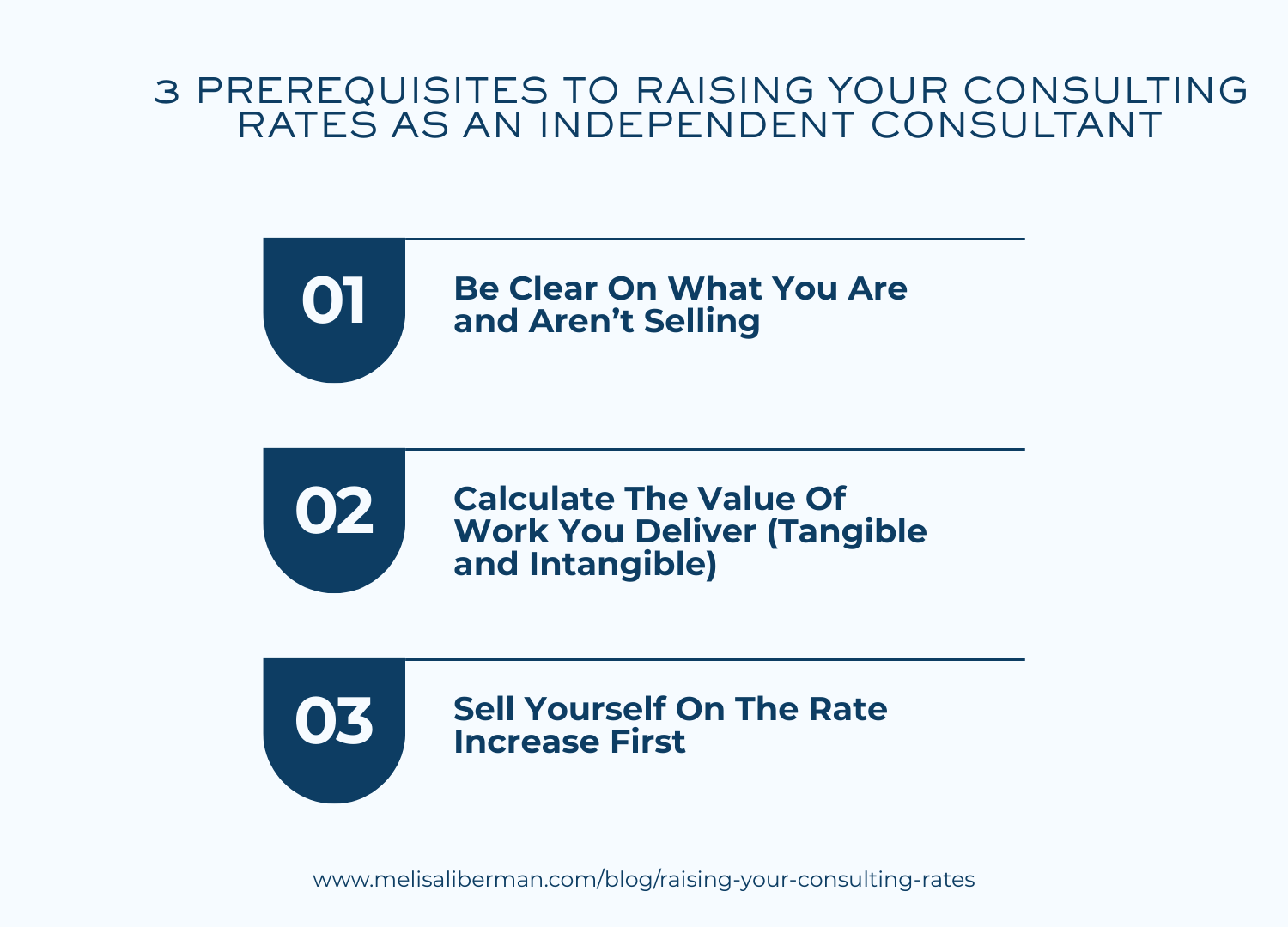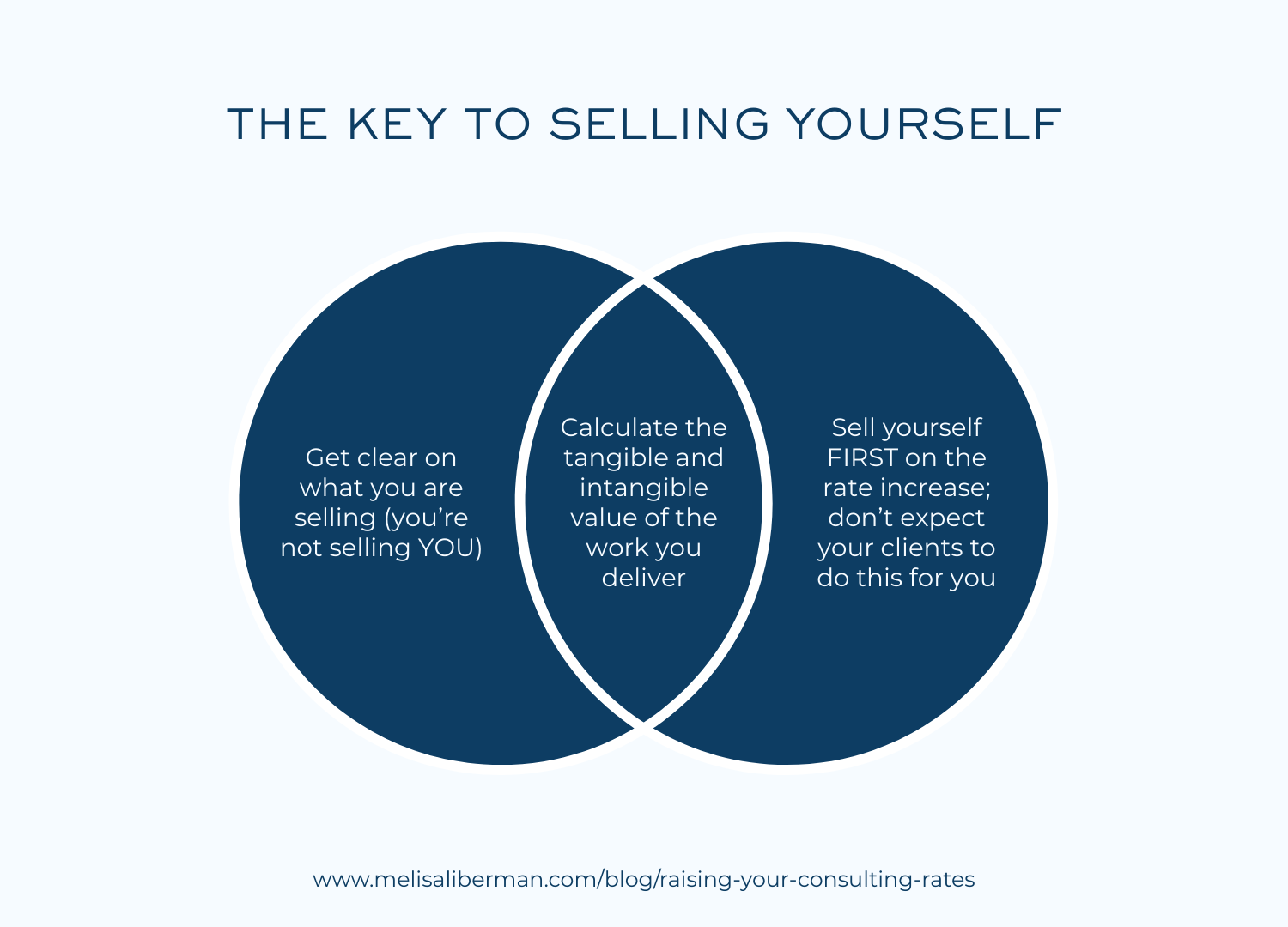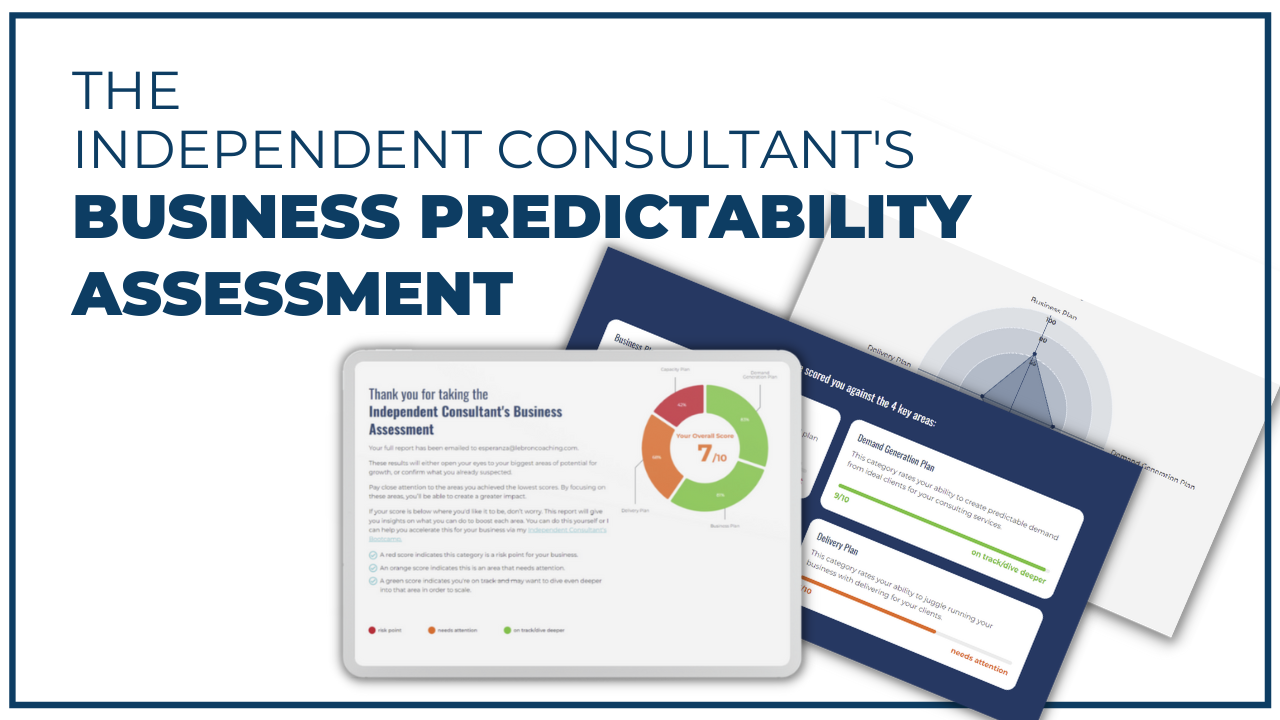The 3 Prerequisites to Raising Your Consulting Rates as an Independent Consultant
Jun 17, 2022
Estimated Reading Time: 19 minutes
Download the article as a PDF:

Introduction
How do you know if it’s time to raise your consulting pricing, as an independent consultant?
Most independent consulting business owners don’t manage their pricing increases intentionally.
Instead, it’s common for independent consultants to think they need to work on a certain number of projects or have a certain number of clients before raising their pricing.
For you, as an independent consultant, what is your prerequisite for raising your consulting pricing?
I’m asking this directly of you, not rhetorically.
What’s your “as soon as _____________” happens statement that you feel must be accomplished before you raise your consulting pricing?
Separating excuses from logic
I find that almost all the time, this list of “as soon as ___________” happens, are actually good, seemingly rational, excuses for avoiding what feels really uncomfortable.
- Making proposals that ask for more money
- Believing the outcomes you produce are worth more money
- Believing clients will willingly pay you more money
I want to help you to separate the excuses from the true prerequisites, so you are clear on your own process for raising your consulting rates.
In today’s article, I’ll share the three prerequisites to raising your rates that you may not have considered before.

Prerequisite #1 – Be Clear On What You Are and Aren’t Selling
The first prerequisite to raising your solo consulting rates is to be very clear on what you’re selling, and also what you’re not selling.
What You’re NOT selling
As a coach who works with consulting business owners on a daily basis, I find that many (if not most) consultants get confused about what they’re selling.
It’s common as a consultant to think that you’re selling yourself.
You’re not selling yourself unless you want to be a staff augmentation or “extra pair of hands” type of resource.
If you’re reading this, I’m guessing that isn’t your goal.
You didn’t leave corporate in order to work as a commodity.
When you think you’re selling yourself, it’s easy to hit a limit on what you’re charging. And then, you’re constrained by what you think you’re worth and how much your time is worth.
It’s imperative that you decouple YOU from your services.
Your worthiness has nothing to do with what you charge.
And that’s good news.
So, what are you selling then?
As a consultant, you’re selling the outcomes you help your clients achieve.
When you separate the outcomes and benefits you help your clients achieve and start charging for that work, your revenue potential can be endless.
So, the first prerequisite to charging more as an independent consultant is to stop thinking you’re selling yourself.
Prerequisite #2 – Calculate The Value Of Work You Deliver (Tangible and Intangible)
The second prerequisite to raising your solo consulting rates is to understand the tangible and intangible value of the work you deliver.
As a coach for independent consultants, we almost always work together to update their pricing models. I’ll share one of the first exercises I recommend so you can do this as well:
- Quantify the short-term, tangible impacts of the benefits from the work you
- Quantify the short-term, intangible impacts of the benefits from the work you
- Add these two together to get a full picture of the overall impact
- Then, multiply out the impact over the longer term, to see an even broader picture.
For example, you might be an Agile Consultant.
The short-term impacts (tangible plus intangible) could mean that you save your client $500k a year in costs (e.g. retention, avoiding mistakes, code quality, rework avoidance, etc).
And then, over the course of the typical lifespan of the processes you’ve designed (2-3 years), they could be saving $1M to $1.5M.
So, this type of exercise can be incredibly eye-opening for two reasons:
- When you’re building up this type of business case during the sales cycle, it can help you ask better, deeper questions to get a full understanding of the WHY behind why they’re considering hiring you.
- When you see the value of the benefits you deliver ($1M to $1.5M in this example), then it can be so much more comfortable to propose higher rates. Increasing your rates becomes a no-brainer when looked at from this perspective.
Prerequisite #3 – Sell Yourself On The Rate Increase First
The third and final prerequisite to raising your independent consulting rates is to sell yourself on the rate increase.
Yes, you read that correctly.
You have to sell yourself first before you can sell anyone else.
As a coach for independent consulting business owners, I find that most ICs overlook this key, critical step.
Gaining Permission to Increase Rates
It’s common for consultants to think:
- your opinion about your pricing doesn’t matter and/or
- the market determines whether your pricing is in line or not.
These are both untrue.
How do I know they’re not true?
I’ve seen this same scenario play out over and over again, for myself and for my clients.
I want to save you from learning these mistakes the hard way like I did.
When you think your pricing is too high or you assume that the client won’t want to pay it, think about how that impacts you.
Of course, you would show up with hesitation and come across as tentative if you’re thinking the pricing is too high or that the client won’t agree to it or that it’s out of line with the market.
You end up coming across with self-doubt and looking to the client to bolster your confidence.
You end up undermining yourself, and your expertise.
This doesn’t work.
Let’s look at the alternative.
The Key To Selling Yourself
If you fully understand the value of the work you do, believe in it 110%, and believe the pricing is a no-brainer, then you will show up in a leaderly, confident way.
In turn, you build trust and confidence with the potential client.
Do you see how your thoughts about your pricing are at the core of how you come across during the sales cycle?
Your confidence doesn’t come from the numbers on the proposal.
Your confidence comes from the quality of your thinking about those numbers.
The key here is to cultivate and build up your unshakeable belief in your pricing and results, and not to delegate that to your potential clients.
- Get clear on what you are selling (you’re not selling YOU)
- Calculate the tangible and intangible value of the work you deliver
- Sell yourself FIRST on the rate increase; don’t expect your clients to do this for you

In Conclusion
As an independent consulting business owner, it’s common to think that you need some external permission to raise your rates. It’s also common to defer or delay raising your rates when you think the reasons are logical. But, after you peel back the layers, you realize that you’re avoiding increased rates because it’s uncomfortable.
To put this work into action, I recommend you integrate these three prerequisites into your business and then implement a standard practice of raising your rates after every engagement.
For More
- Episode 066 of the Grow Your Independent Consulting Business – The Pre-Reqs To Raising Your Consulting Prices
- Episode 051 of the Grow Your Independent Consulting Business – The 4 Root Causes for Undercharging as an Independent Consultant
- Episode 052 of the Grow Your Independent Consulting Business – The 5 Steps to Overcome Undercharging
- Take the Independent Consulting Business Predictability Assessment I’ve created for you. It will help you pinpoint the areas to improve so you increase the predictability and sustainability of your business, so you don’t leave money on the table or make owning a business harder than it needs to be. Click here to take the Assessment.
About the Author
Melisa Liberman is a fellow independent consultant (for the past 10 years), who has first-hand independent consulting business experience and a pile of mistakes under her belt.
As a business coach and strategist, Melisa works one-to-one with independent consultants to help them build out the four key pillars of their consulting businesses – a clear business plan, predictable demand generation, scalable capacity management, and repeatable client delivery. Her clients walk away feeling confident as business owners who make more money, have more impact, and do it without sacrificing their personal life or sanity.
For more resources from Melisa:
- Listen to the Grow Your Independent Consulting Business Podcast.
- Take her (free) Independent Consulting Business Predictability Assessment to pinpoint your biggest area of opportunity and receive the next 2 to 3 steps you can take to advance your business with more confidence and ease.





